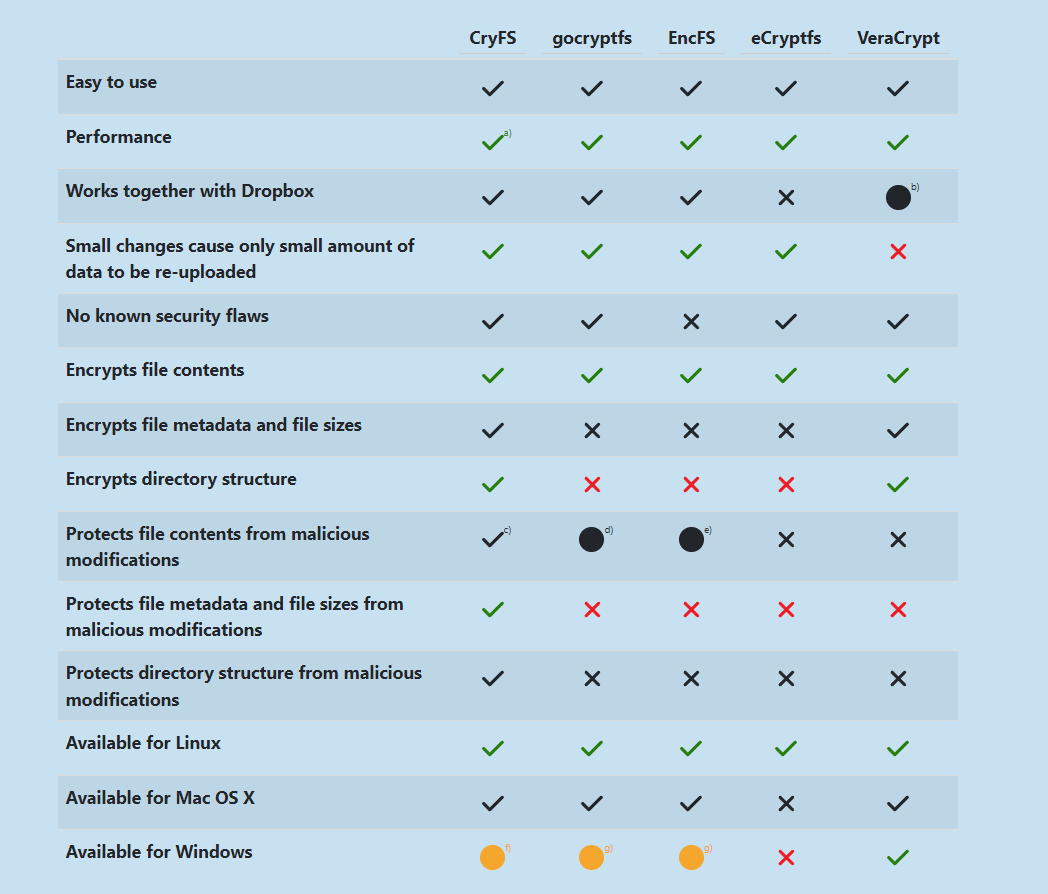CryFS does what you want, it's the default used by the KDE Vaults feature.
there's also a comparison page on the site, comparing it to other solutions.
From Wikipedia, the free encyclopedia
Linux is a family of open source Unix-like operating systems based on the Linux kernel, an operating system kernel first released on September 17, 1991 by Linus Torvalds. Linux is typically packaged in a Linux distribution (or distro for short).
Distributions include the Linux kernel and supporting system software and libraries, many of which are provided by the GNU Project. Many Linux distributions use the word "Linux" in their name, but the Free Software Foundation uses the name GNU/Linux to emphasize the importance of GNU software, causing some controversy.
Community icon by Alpár-Etele Méder, licensed under CC BY 3.0
CryFS does what you want, it's the default used by the KDE Vaults feature.
there's also a comparison page on the site, comparing it to other solutions.
Yeah, I was going to suggest KDE vaults as well.
I'm assuming you don't want a full disk encryption solution, but you can also use LUKS to just create an encrypted mount of any supported filesystem. You don't need any type of standalone program to encrypt your things for you.
Makes sense
Here's a table with multiple solutions and comparisons: https://www.cryfs.org/comparison

Just be aware that some solutions like gocryptfs are provided on a user-space filesystem (Fuse). This has a very low performance and most importantly if you require inotify on the decrypted data for some application then it won't be available. In short inotify is what allows apps to watch a filesystem for changes and act accordingly in real time.
Tables like this suck. They are made by one of the projects in the comparison and they include no data.
Better than nothing. :)
I use gocryptfs with a GUI wrapper called Vaults. It's very neat.
Sounds like you're looking for EncFS.
It'll leak the size and structure of whatever you have there. Filenames and content are encrypted.
You have a few options.
My preferred way is to create an encrypted disk image using LUKS, backed by a sparse file. Sparse means that, while you'll still need to specify a size for the encrypted volume, it won't actually use the space on the underlying disk until you use the space on the encrypted volume. You could even make the encrypted volume bigger than your physical disk (though of course you'd get an error if you tried to actually use that extra space).
There are a few ways to setup a LUKS container; if you want to learn how to do it manually, this howto i just found looks like a good overview of the steps (though I wouldn't recommend doing its final Setup auto mount section).
These days, you can also create a LUKS volume on a sparse file entirely using a GUI such as the GNOME Disks program. Using it, just click the hamburger menu and select "New Disk Image" and then with your new disk image selected click the gears menu and "Format Partition" and there should be a checkbox for LUKS on that screen. If you leave "Erase" turned off (which is the default), then the backing file will be sparse.
One downside to the sparse disk image approach is that when you delete files from the encrypted volume you will not regain that space on the outer disk automatically. It is possible to, but requires work to do so which I won't try to document here.
Another approach which doesn't have that downside is to use eCryptfs instead of LUKS. It stores each encrypted file separately (with an encrypted name) and thus doesn't hide the directory structure or file sizes - only directory and file names and file contents are encrypted. It also appears to have not been updated since 2016, but, it is still included in various distributions so it is also an option. You can read about how to use it (and other caveats about it) on the arch wiki.
I use Cryptomator. Does exactly what you describe.
Just be aware you can lose your data. It is really bad with long file names and folders with a large number of files, there are multiple reports online about people losing their data. I personally have experienced this with large file names and once an entire vault that suddenly couldn't be open.
I'm pretty sure most of the reports online is rooted back to user error.
That doesn't help the people who lost data.
And the reports are common enough that it suggests cryptomator should consider making some interface changes.
I have used gocryptfs (https://github.com/rfjakob/gocryptfs) in the past, it creates an overlay mount that encrypts each dir and file separately, so no need to precreate a container. There are some security downsides to this approach though so be aware of that. https://nuetzlich.net/gocryptfs/threat_model/
EncFS, CryptoFS, eCryptFS...
that creates encrypted archives, but doesn't provide a mountable filesystem (which is what OP means by "real-time").
Ah ok, well LUKS in that case I guess
Ext4 encryption